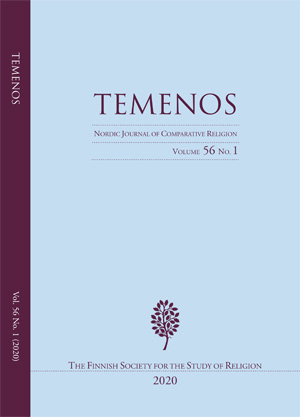Religious Governmentality
The Case of Hizb ut-Tahrir
DOI:
https://doi.org/10.33356/temenos.78154Keywords:
Modernity, Subjectivity formation, Governmentality, Hizb ut-TahrirAbstract
In this article on the role of religion in the formation of modern subjectivities we use a contemporary transnational Islamist organization, Hizb ut-Tahrir, as our example. We examine how technologies of domination are combined with norm-setting technologies of the self in shaping new modern Muslim subjectivities among its members. First, we present our theoretical perspective and analytical framework. Then we describe the ideological roots of Hizb ut-Tahrir in the intellectual universe of nineteenth-century thinking about Islamic reform. Third, we analyse the practice of tooling or processing minds, souls, convictions, physical appearance, and behaviour among members of the organization. As our major interest lies not in Hizb ut-Tahrir as such but in the role of religion in the formation of modern social subjectivities, we conclude with some general reflections on this question.

Downloads
Published
How to Cite
Issue
Section
License
Copyright (c) 2020 Dietrich Jung & Kirstine Sinclair

This work is licensed under a Creative Commons Attribution 4.0 International License.
Author's Guarantee
- The Author acknowledges that the Work will be publicly accessible on the Internet and that such access will be free of charge for the readers.
- The Author guarantees that the Work is her/his original work that has not been published before and cannot be construed as copying or plagiarism. Furthermore, the Author confirms that the Work contains no statement that is unlawful, defamatory or abusive or in any way infringes the rights of others.
- The Author confirms that she/he has secured all written permissions needed for the reproduction in the Publication of any material created by a third party.
User Rights
Under the CC BY 4.0 license, the Author/s and users are free to:
- Share — copy and redistribute the material in any medium or format,
- Adapt — remix, transform, and build upon the material for any purpose, even commercially,
- However, the Work must be attributed to the original Author and source of publication.
The license of the published metadata is Creative Commons CCO 1.0 Universal (CC0 1.0)
Author Rights
The Authors maintain the right to:
- copyright, and other proprietary rights relating to the Work,
- the right to use the substance of the Work in future own works,
- the right to self-archiving/parallel publishing (publisher's PDF allowed).
Rights of Publisher
- The Publisher reserves the right to make such editorial changes as may be necessary to make the Work suitable for publication in the publication, e.g. style of punctuation, spelling, headings and the like.
- The Publisher will publish the Work if the editorial process is successfully completed and reserves the right not to proceed with publication for whatever reason.
- The publication entitles the author to no royalties or other fees. This agreement will be governed by the laws of Finland.






